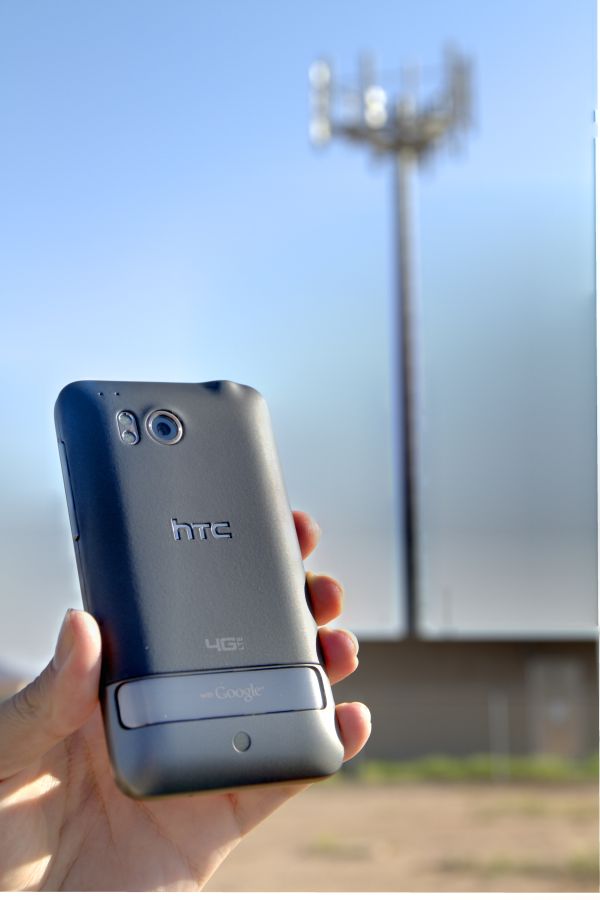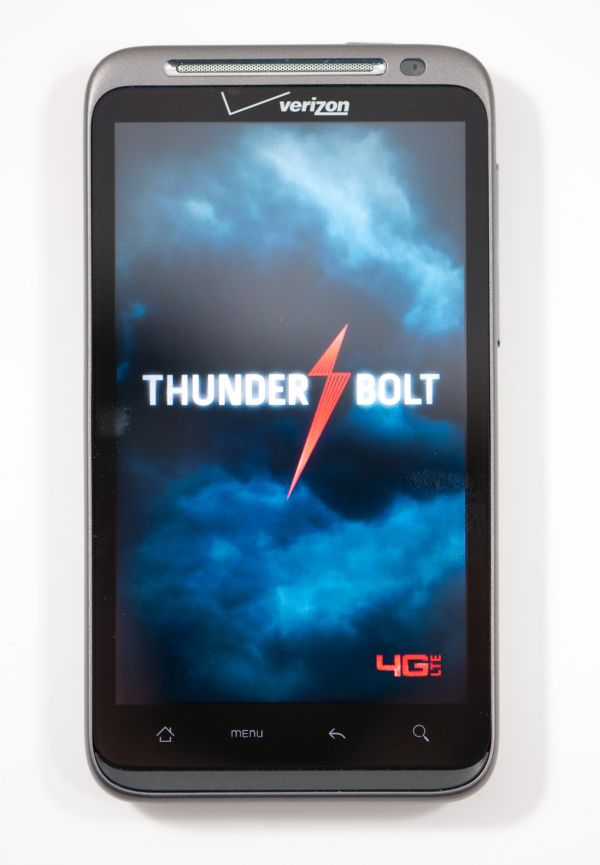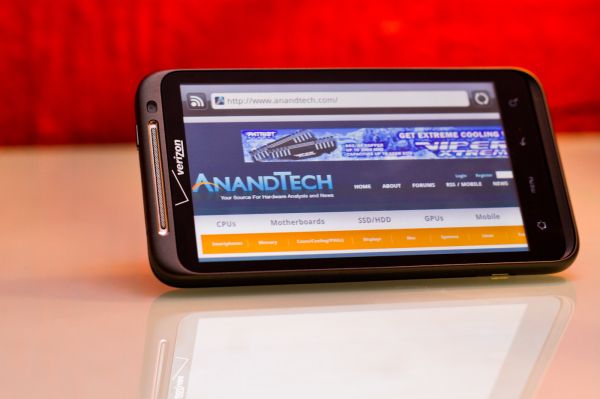HTC Thunderbolt Review: The First Verizon 4G LTE Smartphone
by Brian Klug on April 27, 2011 12:12 AM EST- Posted in
- Smartphones
- HTC
- Verizon
- LTE
- 4G
- Android
- HTC Thunderbolt
- Mobile
- MDM9600
- MSM8655
Conclusion
The Thunderbolt reminds me of the EVO, and otherwise shares design language with all of HTC’s 4.3” form factor smartphones. The comparisons are so completely obvious that it’s almost pointless stating all of them. It’s a phone packed with latest and greatest cellular connectivity that actually does a very good job at disguising the number of design challenges doing so poses. LTE is easily an order of magnitude faster than EVDO, and if you're as obsessed with cellular network throughput as I am, the added thickness and reduced battery life are absolutely worth it.
I’ve talked a lot about thickness and weight, but at the end of the day the Thunderbolt is entirely pocketable and feels great in the hand. Despite not being metal and unibody like the Desire HD, the phone feels sturdy and build quality isn’t going to disappoint. It’s almost unfair to make size and weight comparisons against devices that are primarily built around one transceiver and a SoC.
That said, there’s no getting around issues such as battery life and the fact that though the Thunderbolt is the current latest and greatest, it still lacks dual core and a qHD screen. Those two features are going to be must-have in the next set of refreshes from HTC, and as a result makes the Thunderbolt almost feel a bit delayed. Battery life can be doubled by using the double capacity official battery, but again at the expense of adding more mass and thickness to an already beefy handset.

The HTC Thunderbolt in front of a Verizon 4G LTE eNodeB
The Thunderbolt’s cellular architecture is impressive, and its status as the first smartphone on Verizon (or CDMA2000 to the best of my knowledge) that can offer simultaneous voice and data in both 3G and 4G network conditions is a huge plus even if you aren’t in a 4G LTE market. It’s very surprising to me that Verizon has neglected to pick up on and aggressively market that selling point, considering AT&T's repeated jabbing. It’s a special extra that will likely continue to distinguish the Thunderbolt from a growing lineup of 4G LTE enabled smartphones set to arrive on Verizon this year. It's likewise surprising that the Thunderbolt isn't a "Droid" level phone, and considering the amount of unique things the Thunderbolt brings to the table, the other 4G LTE smartphones will have their work cut out for them stacking up. 4G LTE works perfectly on the handset, and is fast enough that I believe we’re back to page loading being SoC-bound rather than network-bound.












71 Comments
View All Comments
cmdrdredd - Thursday, April 28, 2011 - link
Or if you're stuck on an old android phone that has no memory, hardly any cpu or gpu power, and bogs down heavily all the time thanks to the new OS revisions not being highly optimized for slower phones (no upgrade path even for some too), and you decided you don't want to be a slave to Apple and what they decide you can and cannot have/do with the device, you might look at this for your upgrade if you were itching right now. Why wait for June to see the new Droid Bionic when you need a phone now that works properly and is faster?deputc26 - Wednesday, April 27, 2011 - link
Now THIS is a smartphone review. This is the meticulous quantitative data that I keep coming back to Anandtech for. Would like to see real world load times of real web sites though.7Enigma - Wednesday, April 27, 2011 - link
Seconded. I'm not a huge fan of smartphones (I don't own one and normally just skim the reviews for hardware/OS information) but this one reminded me of old-school Anandtech. Nitty-gritty detail and substance that anyone can tell required a LONG time to write.And factoring in the legitimate excuse of being ill made it all the more impressive.
Great job again Brian.
kurt-o - Wednesday, April 27, 2011 - link
The article stated "Remember that although the HTC EVO 4G could have conceivably supported simultaneous 4G WiMAX and 1x voice, the feature was disabled and to my knowledge hasn’t ever been enabled. It’s for this reason - until the Thunderbolt no proper procedure for characterizing dual transceiver phones existed."Unless I'm confused here, the article appears to have a blatant error. The HTC EVO 4G supports simultaneous 4G WiMAX and 1x-Voice. Has since day 1.
metafor - Wednesday, April 27, 2011 - link
I think what's meant is that it can't do simultaneous voice and data over 3G, which is true. If you are in a 4G area, I believe the Evo can use WiMax for data and 3G for voice.Brian Klug - Wednesday, April 27, 2011 - link
Are you certain? Although I have an EVO I'm not in a WiMAX market, so I can't test for certain. I know that WiFi + 1x voice is a definite go, 1x voice + EVDO is a no, but I was under the impression again that 1x voice + WiMAX is also a no.From the user manual:
"Can I make calls and use data services at the same time?
You cannot use voice and data services simultaneously. If you receive a call while data service is active, your device forwards the call to voicemail. You can place an outgoing call anytime, but it will interrupt any in-progress data session."
-Brian
privater - Wednesday, April 27, 2011 - link
Does this phone have a nuclear battery as accessory?ompaidjo - Tuesday, May 3, 2011 - link
:DI kept thinking about the same thing, since I bought this phone..
strikeback03 - Tuesday, May 3, 2011 - link
It isn't great, but then again I'd say that if you need several hours of web browsing time per charge a smartphone is probably not the right device for you anyway.ltcommanderdata - Wednesday, April 27, 2011 - link
4G brings better speed for the end user, but sometimes I wonder if I'd be more worthwhile to invest instead in existing 3G infrastructure to ensure wide area, consistent 3G coverage at the upper speed spec of 3G rather than focus on 4G peak speeds in some areas. I guess 4G is more worthwhile on CDMA networks where the speed disparity is greater than on GSM networks where up to 14Mbps HSPA vs LTE isn't as big a difference in usability.On an unrelated note, your benchmark charts don't seem to include the updated iOS 4.3 results that say the previous Dell Venue Pro review had. The updated browser in iOS 4.3 compared to iOS 4.2 makes a material difference in the benchmarks.